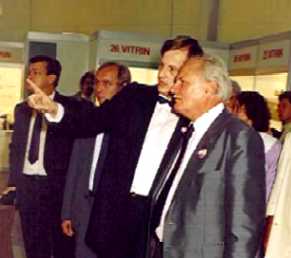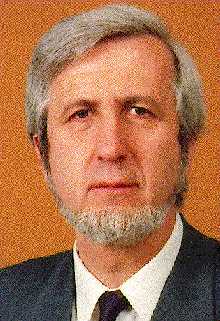
In this column I would like to shortly and a bit differently comment upon those so-called „little news” which take place in some part of the world outside our borders but deal with us.
I publish my writings separated from each other, with title and date, and the newest writings always will be put on the top under this introductory. This way by reading the first writing the dear readers had seen before, they would know that all the following lines had been read by them before. But the possibility of reading my earlier writings again anytime will remain henceforward for the readers, if they would like so.
November 25, 1999 – Dangers of the spiteful soul – The letter of our ambassador, Géza Jeszenszky.
During my career I often met people who – otherwise having big knowledge – I felt were different from me and I was seized by a bad feeling talking to them. It took a long time to me to recognize the reason of my aversion. I already know that the thing that I felt repulsion for in the case of most of them was their relation to their own set of values. It was not easy to recognize these thoughts. The things delivered during our professional or even general discussions or the listening to their speeches, the reading of their writings could stay within those bounds – even for years – where the delivered thoughts stood really close to me, only the terminology was a little strange, that is all.
The perception always came unexpectedly. It was an uninteresting debate, a ministerial answer, a private letter that showed me that this person’s personality really stood very far from me. A man who I could respect before for having own recognizable set of values, consistent thoughts, even outstanding knowledge. The trouble begins and end also ends when the one forming his own set of values obliges not only himself to adopt it but also expects others to follow his opinion without any critiques!
This behavior might be called vocation, might be called stubbornness, or bigoted opinion, but to me this self-notion mostly belongs to the extremists. These people existed in all ages, could be found in all professions, their existence is limited neither to age-group nor to sex or education. I do not like them even if their names are connected to many scientific discovery in science, world-famous works of art, self-denial referring to human greatness in history too. True enough that in the position of power or ruling it was these people who sent researches to a dead-end for years, made the people of different opinion be harassed and the most of the unleashing of the wars were connected to these people too. In the extreme way of thinking it is of no significance whether the concerned ones are extreme nationalists, leftists or the forcible representatives of their religious affiliation. It is their natural character to disclaim their bigot character even to themselves because they are pledged to their own faith too, so this way they are convinced democrats in politics. I really had been terrified many times listening to the speeches in the Parliament, paying attention to the MPs who declared themselves Christians but stoned others in their speeches and expelled their critics from among them. I wonder whether they have read the „Ten Commandments” at all?! And had they understood these commandments if they had read them?
Géza Jeszenszky’s speeches in the early 90’s only disturbed me. Later I felt I did not like this man, maybe I found him insincere. Now I think I was wrong in his case too. Géza Jeszenszky believes in what he says, he is pledged to his thoughts. But the nature of his pledge is detrimental. Detrimental, but not illegal until he does not have means, office and function to represent his own opinion forcibly. But his actions will become even illegal if (becoming a public functionary) he transgresses the law for the sake of his conviction on the basis of the well-known principle „the end justifies the means”. It is detrimental and violates the law if he makes an untrue declaration about the selling of weapons as foreign minister (February 1991), then discredits our country by his assignment with „I can do anything because I have a responsible assignment” (Austria, December 1993) or „I can incite hostility by speaking plainly or in a private letter” (December 1990, November 1999).
I am concerned that (though his principles stand much closer to me than those of for example István Csurka) Géza Jeszenszky is just as unsuited to be civil servant, minister or ambassador of a democratic country as the leader of the home extreme right.
My final note: Viktor Orbán hold the above-written opinion of Géza Jeszenszky in the September of 1990, he claimed his replacement because of his inaptitude. Even to his own mind, Géza Jeszenszky -probably- has not changed since then. Géza Jeszenszky is the ambassador of our country in the United States assigned by Viktor Orbán. If Géza Jeszenszky has not changed then is it perhaps Viktor Orbán’s set of values what has altered?
November 01, 1999 – Viktor Orbán’s statement in Canada about the suffrage of the Hungarians living abroad
During my political career I often got into a situation where I knew that there was such no answer for the raised question which was acceptable for all those present. It results from the fact that people are marked by significant divergence of opinion in that matter independently of their station in life or sex. This issue can be the death penalty, the permission for abortion, the culpability on infants committing murder, the mortally sick person’s free determination about the continuation of medical treatment, the mercy killing, etc.
In such a case the political schools not respected by me suggest that the questioned person shall dodge the question or his answer shall allow of be given many possible interpretations or shall be obscure, etc. I approach this (too) in a different way. When a politician asks confidence from his electorate then by acquainting himself he has to give the same confidence to those, whose confidence he would like to get. This can mean losses in the beginning but later it can save him from a lot of explanation of his conduct. Without really assuming his viewpoint, in his answer Viktor Orbán referred to that the support of the two-third was needed for the modification of the electoral law and the opposition MSZP and SZDSZ would not assure it. As for my opinion, I say that we shall and have to get to know the actual support by parliamentary vote. This issue is not a typical issue of party politics (Christian, leftist, and/or liberal), so I would rather render it probable that all the parties would let their members decide unimpeded. I am sure that in the so-called „by name” vote many politicians of the MSZP and the SZDSZ would support the suffrage of the Hungarians living abroad, while many representatives of today’s coalition-government would disapprove it. In my opinion it would be important for the viewpoint of the majority to become really known as much about this issue as about the already mentioned issues. In democracy the opinion of the majority is seemly to be accepted honorably by the others. I would like to stay devoted to my principles here too. For this reason I am not going to sidestep the content of my vote by the above-mentioned expounding of the general principles. I know that my own vote is not causing an unanimous support in my readers now, why the bilinguals of my writings and the Internet-access serve just the purpose to let my thoughts be known also by the ones living over the Hungarian border. My vote would probably support a solution which would let a Hungarian citizen living any in any point of the world decide which Parliament he would vote for. Anybody can own more flats and live in more cities in Hungary too. But before the vote he has to decide where he would like to exercise his voting rights because one person has one vote. It has no influence on the number of votes whether I have only one residence or because of my life, chances I live, work in more places. It neither can make a difference whether these more places are more Hungarian cities or one or more are found abroad. It can be my duty to go abroad for years but, fortunately, nowadays I already can decide on my own either about leaving or about coming home. For this reason I think I certainly have to decide at the time of the elections. Well, this is my opinion. On the other hand it would not mean an inner nuisance to me to acknowledge if the majority saw it differently. Also many other solutions can be raised. Like, the Hungarians living abroad could get voting right „only” in the list voting system, while beside the list the people living in this place could vote for also the individual representative of their own district. Many Parliaments have a different regulation for the special vote assuring the parliamentary representation to the minorities. On the basis of this principle the issue of a few representative positions, in a definite number, obtainable by the votes of the foreign Hungarians could be raised. A lot of other ideas would be surely worth discussing.
I suggest, let us talk them over as soon as possible!
October 31, 1999 – Viktor Orbán’s statement in Canada about the nuclear weapons.
During his visit in Canada, answering to a journalist’s question prime minister Viktor Orbán made such a statement that considering the doubtful internal situation in Russia and Belarus and the possible aftermath of the next election returns, in case of an unfavorable change, at the request of NATO, the Hungarian government would look into the possibility of letting nuclear weapons in Hungary. This piece of news published in the Canadian papers was received with mingled feelings in Hungary.
I find the statement unadvised and politically defective but the dressing of the news in some press publications certainly did not help to blunt the mistake, but multiplied its harmful effect, and by this, in my opinion, it went shares in taking the responsibility. It is classed among the unwritten rules of the political etiquette of the well-developed countries that, except in the case of the so-called disarmament conferences, no statements shall be made in the subject of nuclear armament and such questions of the journalists shall be dodged without any answer. That is to say, the nuclear weapons are immensely destructive, inhuman and immoral and produce fear and uncertainty because of the incomprehensibility of their operation. Mentioning them by responsible and influential politicians can awaken incalculable political decisions itself, but the sense of fear produced by dealing with this subject is definitely favorable for the demagogic remarks of the extreme and nationalist trends of the given country and for the increase of their undesirable support. The answer, that the government will consider it if some day they will receive such a request, is not a successful way to „dodge” the question. It is a concrete answer and in its capacity as this it became suitable to cause political debates to break out. It would have been much more refined of the prime minister to say such things as answer like this issue was not on the carpet at present and also senseless in Hungary. Fortunately the government does not have to deal with the issue of nuclear weapons now. Neither in Hungary or in NATO the idea of bringing nuclear weapons to Hungary is dealt with by anybody today, etc.
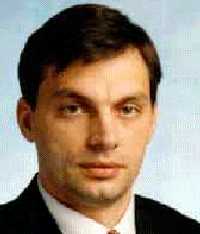
That nor politically fortunate fact, that the prime minister did not dodge the question, involved professional doubts itself, too. The modern military-political issues aim at saving the peace, disarm the borders of the doubtful areas to dissolve the local tensions. Centuries ago the troops were garrisoned on the border (in the border fortresses) of the areas of different political and religious systems because the range of the weapons of defense was a few hundred meters. The Hungarian border fortresses did went to rack and ruin that time to save the Christian Europe. Today’s carrier rockets or the deterrent air units can be launched from many hundred or thousand kilometers away as units striking a first or preventive blow. This way it is not necessary at all to station such armaments on the border of the area which make the neighbors reasonably „nervous”, can produce counter moves as well as, because of their nearness, military equipment of vital importance can get under undesirable control by unexpected military actions. Keeping these weapons „near the border” is very risky and the increased security is extremely expensive, while they are unnecessary in military respect.


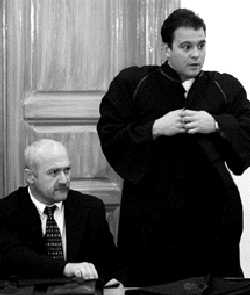



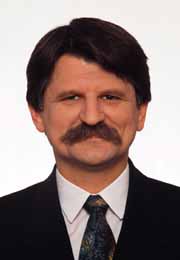

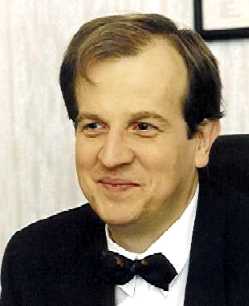
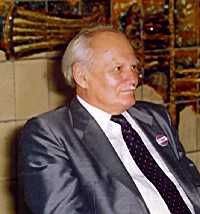 Árpád Göncz
Árpád Göncz